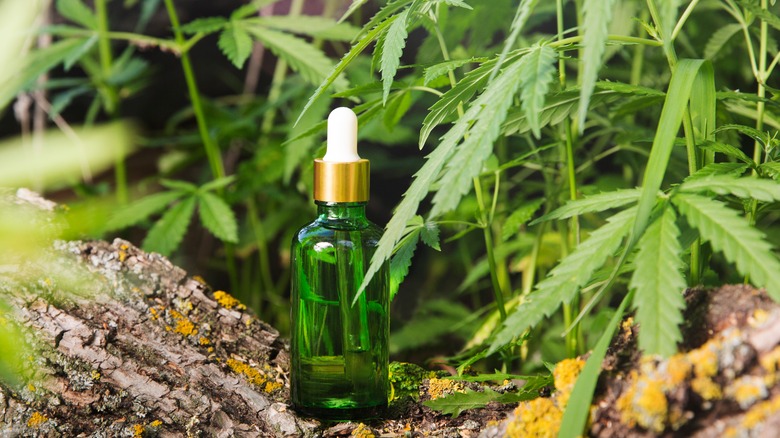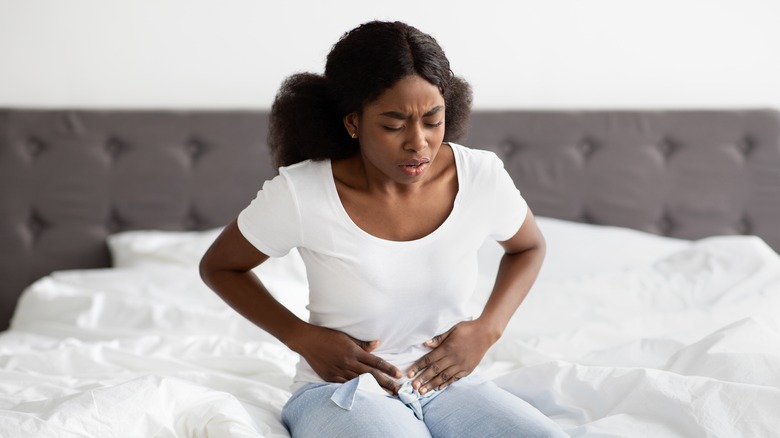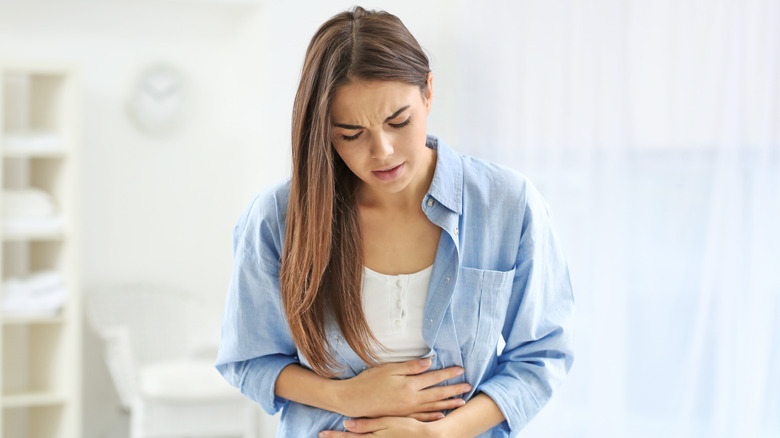How CBD Can Help Alleviate PMS Symptoms
Premenstrual syndrome, or PMS, affects more than 90% of women, interfering with their day-to-day lives. Its symptoms range from mild to severe and may include back pain, headaches, fatigue, mood changes, anxiety, or digestive distress. Some women also experience intense food cravings, bloating, water retention, insomnia, and all sorts of aches, notes the American College of Obstetricians and Gynecologists (ACOG). While it's possible to manage PMS through lifestyle changes, you might still have pain and discomfort before or during your period.
ACOG explains that regular aerobic exercise, meditation, yoga, biofeedback, and certain dietary supplements may relieve PMS symptoms. For example, yoga and other relaxation techniques can help with anxiety and depression. What's more, some yoga poses may reduce lower back pain and improve sleep, says the Mayo Clinic. Dietary changes, such as cutting back on sugar, salt, caffeine, and alcohol, can help with bloating and fluid retention. In severe cases, doctors may prescribe antidepressants, painkillers, diuretics, or birth control pills.
Unfortunately, these measures are not always successful, plus, some medications carry potential risks and can do more harm than good. Diuretics, for instance, can prevent or reduce water retention, but you may experience headaches, dehydration, blurred vision, nausea, and other side effects. Alternatively, you could take cannabidiol (CBD), a natural compound derived from the hemp plant. CBD oil, gummies, and tinctures appear to be effective in managing pain and may help alleviate PMS symptoms.
CBD may relieve menstrual cramps
When that time of the month comes around, your uterus contracts to shed the endometrial lining. This process causes pelvic pain and cramps, loose stools, backaches, and overall discomfort, explains the Mayo Clinic. The pain can be more or less intense and should subside within two to three days. In some cases, it's severe enough to affect your daily life, making it difficult to work, sleep, and exercise.
CBD is by no means a miracle cure for PMS, but it may help relieve period cramps. In a 2019 survey conducted on women with endometriosis, CBD and other cannabis products were rated as the most effective treatment for menstrual pain, reports the journal BMC Complementary and Alternative Medicine. Respondents said that hemp/CBD oil offered better results than yoga, Pilates, and other forms of exercise. Clinical evidence supports the use of cannabidiol for pain management.
For example, a 2020 review featured in the International Journal of Molecular Sciences explains that CBD has analgesic and anti-inflammatory effects. In clinical trials, it has been shown effective in the treatment of both acute and chronic pain, depending on the dosage and route of administration. Plus, it's well-tolerated and has few side effects. Other studies suggest that topical CBD products may reduce pain and swelling without causing significant adverse reactions, according to 2016 research published in the European Journal of Pain.
Cannabidiol reduces anxiety and improves sleep
Anxiety, depression, and insomnia are among the most common symptoms of PMS. You may also experience irritability, diminished mental focus, mood swings, and emotional stress while on your period, notes the Mayo Clinic. These psychological changes are due to the hormonal fluctuations that occur in your body. For example, the "feel-good" hormone serotonin levels decrease during menstruation, resulting in fatigue, depression, pain, and other issues.
CBD is widely used for its anxiolytic, antidepressant, and stress-relieving effects. It not only lowers anxiety levels but may also improve emotional processing, memory, and learning abilities, reports a 2020 review published in Biomolecules. What's more, it seems to be effective at reducing psychotic symptoms and may benefit those with post-traumatic stress disorder (PTSD). Researchers say that CBD can also improve sleep and decrease the stress hormone cortisol levels.
In one study, scientists asked 72 adults with anxiety and sleep problems to take 25 to 175 milligrams of CBD per day for three months. Most subjects experienced significant improvements in anxiety and sleep scores within the first month of treatment. Their symptoms continued to improve over the next two months. Some of the study participants experienced fatigue and mild sedation, but the treatment was well tolerated overall, reports the Permanente Journal. These findings show that CBD can be a safe, effective way to manage anxiety, insomnia, and other symptoms you may experience while on your period or during times of stress.
Consider taking CBD for nausea and stomach upset
Last but not least, CBD may offer relief from nausea and soothe your stomach. As discussed earlier, PMS can throw your digestive system out of whack, leading to diarrhea, constipation, vomiting, and cramps. For example, some women experience constipation because of the increase in progesterone levels, family medicine physician Donald Ford told the Cleveland Clinic. Diarrhea, on the other hand, tends to be more common and severe among those with digestive disorders, such as Crohn's disease.
Clinical research suggests that CBD may reduce nausea and vomiting by activating certain receptors in the brain, explains the International Journal of Molecular Sciences. This compound may also improve the symptoms associated with irritable bowel syndrome (IBS) and inflammatory bowel diseases. Although it doesn't affect intestinal motility, it can ease abdominal pain and decrease gut inflammation. While more research is needed in this area, researchers say that CBD has beneficial effects on digestive function.
All in all, it may be worth trying CBD oil, capsules, or topical products if you experience PMS symptoms. But first, consult your doctor to rule out other potential causes of pelvic pain, heavy bleeding, anxiety, or digestive distress. Meanwhile, tweak your diet and lifestyle habits to get some relief. For example, you could take calcium and magnesium supplements, eat smaller meals, and fill up on complex carbs, recommends ACOG.



